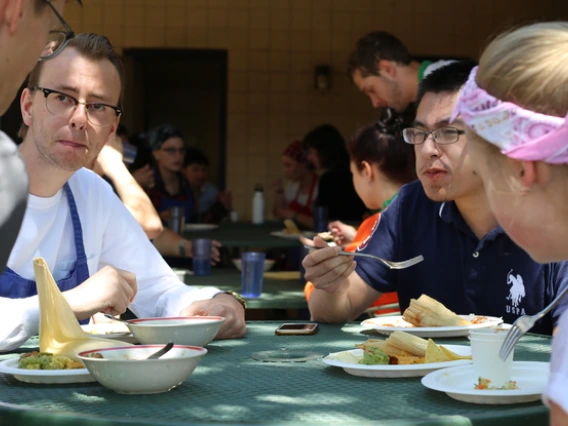A State Department grant is funding a new food-centric Russian course and student exchange program.
In this modified version of the Food Network favorite "Iron Chef," Tucson Village Farm stands in for Kitchen Stadium.
Rather than trained chefs, the contestants are college students — visitors from Moscow — teamed with University of Arizona partners.
The dishes represent two cultures: nopalitos, tamales, pozole and green beans with red chile from the Sonoran Desert region, and blinis, chanakhi and salat Olivier from Russia.
Getting to prepare food together and share a diverse meal, with the added flair of competition, gives the students a memorable experience that expands on what they learn in the classroom.
It's all part of the UA|GRINT Friendship Garden initiative, funded by a $100,000 U.S. Department of State Peer-to-Peer Grant, administered by the American Embassy in Moscow. The principal investigator is Colleen Lucey, an assistant professor in the Department of Russian and Slavic Studies, who is joined by department colleagues Naomi Caffee and Benjamin Jens.
The program includes a new co-convened course on Russian and American foodways, as well as a study-abroad exchange, with students from the GRINT Center at Moscow University for the Humanities visiting Tucson in April, and UA students leaving for Moscow this month.
"The idea is to connect people through foodways, through the mutual experience of sharing food, welcoming guests, the cultivation of food and cooking," Lucey says. "Russian and Sonoran cuisine are drastically different, but some basic staples coincide and it's interesting to discuss in the context of food and culture."
Tucson's 2015 designation as a UNESCO City of Gastronomy has provided opportunities to showcase the region's agricultural history and the culinary blending of cultures, traditions and heritage. The Russian and American foodways class both incorporates that perspective and expands on it.
"That's what got us started down this path in the first place. When we were considering what kind of theme we could use to unite American students and Russian students, food was one of the first things that came to mind because it's all around us," says Caffee, visiting assistant professor of Russian and Slavic studies and instructor of the class.
"The idea is to explore Russian culture and reflect on one's own culture through the lens of food," she says. "The students have readings and field assignments and critically reflect on the relationship between food and identity, the environmental considerations that go into food, and the political and economic processes that underlie what's on our plates."
Urban farming, community gardening and locavore trends have experienced significant expansion in both the U.S. and Russia. However, these movements rarely, if ever, connect and collaborate across borders. The UA|GRINT Friendship Garden program seeks to do just that, with gardens planted in both countries to create a strong partnership between American and Russian students while offering students an in-depth study of Russian and American foodways, emphasizing the historical connections between the two countries and contemporary issues of sustainability, environmental impact and global interconnectedness.
"The course gives students a broader understanding of how individuals and societies can implement change through the locavore movement," Lucey says. "It's getting at deeper issues that bridge the two countries, not just discussing 'this is what we do here and this is what they do there.'"
By analyzing cookbooks, memoirs, cultural histories, films and other media, then reflecting on these materials through peer-to-peer discussion and writing, U.S.- and Russia-based students learn how food cultivation and food culture reflect and bridge the human experience.
"We learned how similar we are. It's very easy being in America to think that Russians are so different from us. But we're complete peers and we became very fast friends," says Ally Felix, a UA sophomore majoring in Russian and microbiology. "I'm excited to be exposed to Russian culture. You can take it in a class, but that's not the same as learning from Russian people and speaking Russian with somebody from the country."
The program was an example of collaboration that the students can remember long after college, says Dasha Suvorova, a Moscow University for the Humanities student graduating this year with a bachelor's degree in international relations.
"It was a great opportunity to come to Tucson and participate in this exchange program," she says. "I learned a lot about American food culture and Mexican food culture and realized that there are similarities to Russian culture. It was great to know that ordinary students like us here are also interested in Russian culture."


